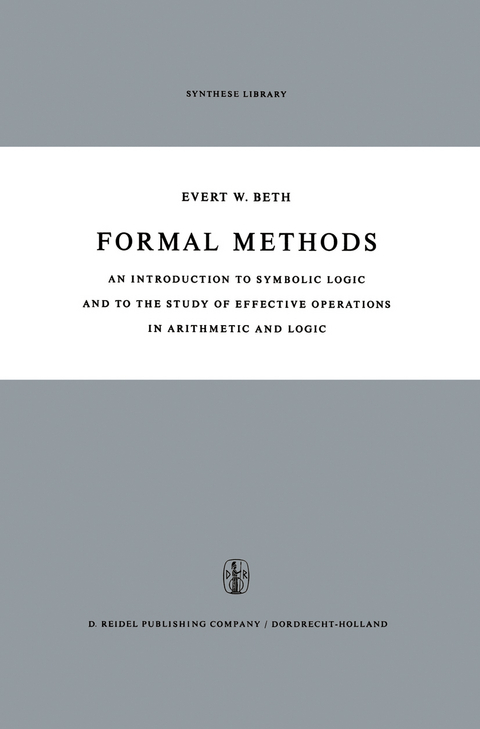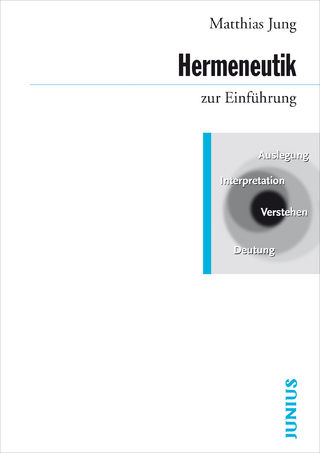
Formal Methods
Kluwer Academic Publishers (Verlag)
978-90-277-0069-8 (ISBN)
Many philosophers have considered logical reasoning as an inborn ability of mankind and as a distinctive feature in the human mind; but we all know that the distribution of this capacity, or at any rate its development, is very unequal. Few people are able to set up a cogent argument; others are at least able to follow a logical argument and even to detect logical fallacies. Nevertheless, even among educated persons there are many who do not even attain this relatively modest level of development. According to my personal observations, lack of logical ability may be due to various circumstances. In the first place, I mention lack of general intelligence, insufficient power of concentration, and absence of formal education. Secondly, however, I have noticed that many people are unable, or sometimes rather unwilling, to argue ex hypothesi; such persons cannot, or will not, start from premisses which they know or believe to be false or even from premisses whose truth is not, in their opinion, sufficient ly warranted. Or, if they agree to start from such premisses, they sooner or later stray away from the argument into attempts first to settle the truth or falsehood of the premisses. Presumably this attitude results either from lack of imagination or from undue moral rectitude. On the other hand, proficiency in logical reasoning is not in itself a guarantee for a clear theoretic insight into the principles and foundations of logic.
I. Purely Implicational Logic.- 1. Introduction.- 2. Deduction-Theoretic Approach.- 3. Semantic Approach.- 4. Axiomatic Approach.- 5. Completeness.- II. Full Sentential Logic.- 6. Introduction.- 7. Introduction of Further Sentential Connectives.- III. Theory of Quantification, Equality, and Functionality.- 8. Notation.- 9. Reduction Schemata.- 10. Axiomatic Method.- 11. Weak Completeness Theorems.- 12. Equality.- 13. Functionality.- IV. Completeness of Elementary Logic.- 14. Introduction.- 15. Quantification Theory.- 16. Theory of Equality and Functionality.- V. The Formalization of Arithmetic and its Limitations.- 17. An Axiom System for Arithmetic.- 18. Syntactic Incompleteness.- 19. Semantic Incompleteness.- 20. Logic of Higher Order.- VI. The Theory of Definition.- 21. Introduction.- 22. Definability of Primitive Notions.- 23. Padoa’s Method.- 24. Definition-Theoretic Incompleteness.- VII. On Machines Which Prove Theorems.- 25. Introduction — Computation and Formal Deduction.- 26. Formal Deduction and Computing Machines.- 27. The Subformula Principle.- 28. Semantic Tableaux and Natural Deduction.- 29. Complications.- 30. Introduction of New Individual Parameters.- 31. Types of Logical Problems.- 32. Concluding Remarks.- Appendix: Supplementary Explanations.- 33. Formal Description of Deduction by Closed Semantic Tableaux.- 34. Independence.- 35. Intuitionistic Logic and Minimal Calculus.- 37. Elementary Logic with Equality and Terms.- 39. Semantic Rules for Quantification Theory.- 40. Deduction-Theoretic Treatment of the Theory of Quantification.- 41. Numerical Computation.- 42. The Interpolation Theorem of Craig-Lyndon.- List of Schemata and Axioms.- (A) Sources.- (B) Recommended Reading.- (C) Periodicals.- Index of Authors and Subjects.
| Erscheint lt. Verlag | 31.7.1970 |
|---|---|
| Reihe/Serie | Synthese Library ; 4 |
| Zusatzinfo | XIV, 170 p. |
| Verlagsort | Dordrecht |
| Sprache | englisch |
| Maße | 155 x 235 mm |
| Themenwelt | Geisteswissenschaften ► Philosophie ► Allgemeines / Lexika |
| Geisteswissenschaften ► Philosophie ► Logik | |
| Mathematik / Informatik ► Mathematik ► Logik / Mengenlehre | |
| ISBN-10 | 90-277-0069-9 / 9027700699 |
| ISBN-13 | 978-90-277-0069-8 / 9789027700698 |
| Zustand | Neuware |
| Informationen gemäß Produktsicherheitsverordnung (GPSR) | |
| Haben Sie eine Frage zum Produkt? |
aus dem Bereich


